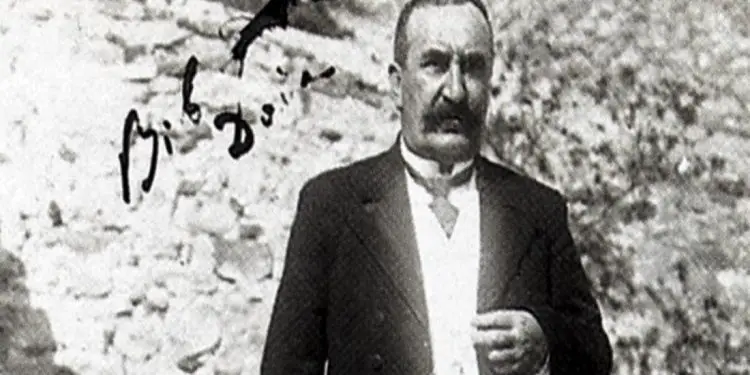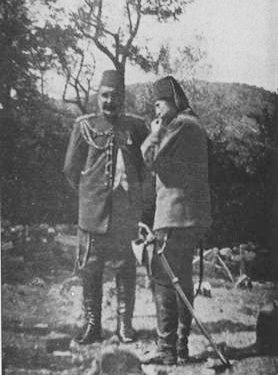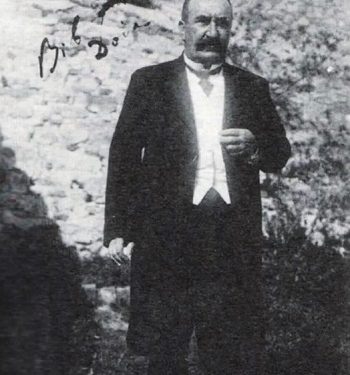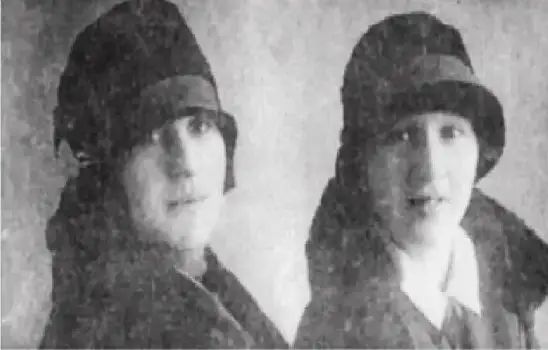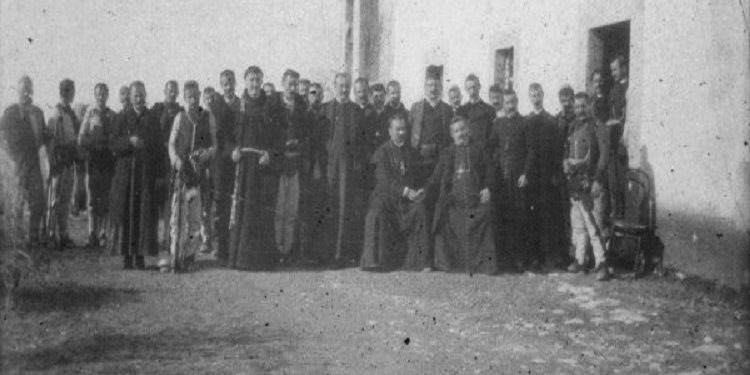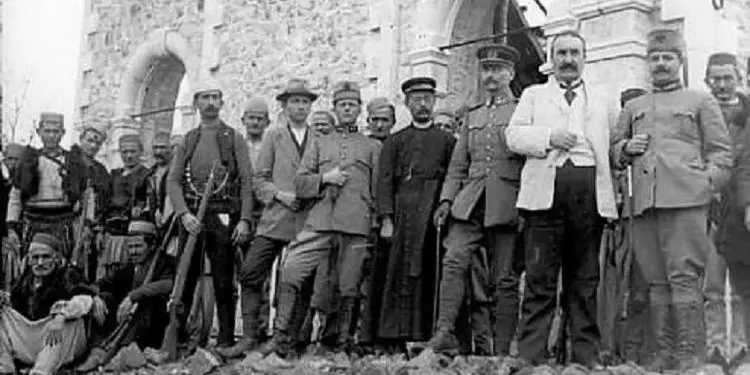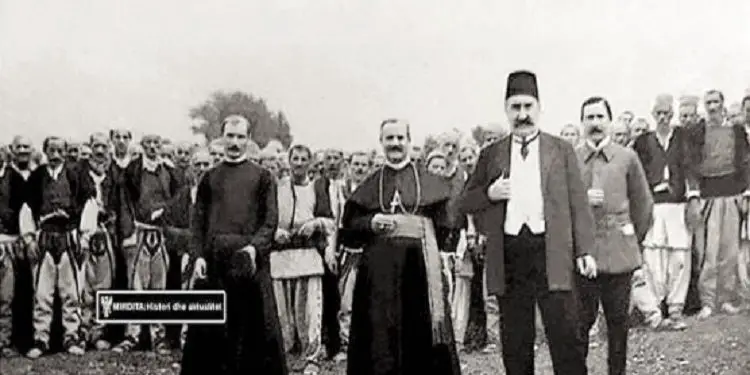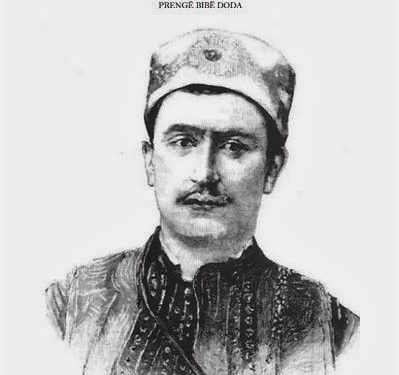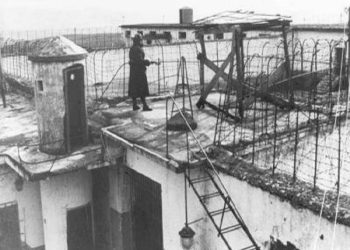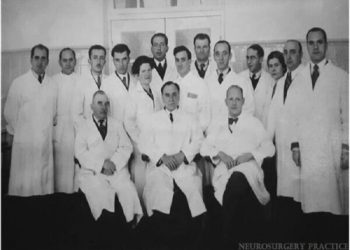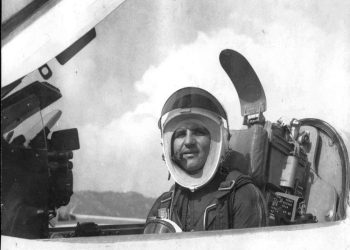By Dr. Nikol Loka
Part sixteen
“PRENGA BIBE DODA, THE SHADOWS OF A CITIZENSHIP”
Memorie.al / The newest book “Prengë Bibë Doda, a phenomenon in Albanian political life”, by researcher Nikollë Loka, not only expands the scope of historical studies on Mirdita, the Door of Gjonmarkaj and the figure of the Mirdita Prince, Prengë Bibë Doda, but it is also a contribution to national historiography. The very rich archival material, the literature used or consulted, oral traditions, etc., make this book a real study treasure, giving the science of history a scientific monograph that enriches our knowledge of Mirdita, its captains, tradition, history etc. To study such an important and complex figure, as the figure of Prengë Biba Doda, is a high scientific responsibility that not everyone undertakes. Nikollë Loka, has done a great job of research and treatment by the professional researcher, giving us the portrait of the prince and the general Mirditor, with the true contours. Dr. Loka has adhered to the end of the space and time, in which the multidimensional events and their protagonists have developed.
THE MONOGRAPH “ABOUT BIBË DODA, A PHENOMENON IN ALBANIAN POLITICAL LIFE”, A VALUABLE SCIENTIFIC STUDY THAT ENRICHS THE FUND OF OUR HISTORICAL STUDIES
(By Mr. Sc. Murat Ajvazi, March 2017, Switzerland)
Continues from last issue
Second internment, 28 years
On November 22, 1880, an important port in the Adriatic Sea was removed from the Albanian space and our nation, an important chain for its economic progress was severed. (317) Researcher Bernard Stulli, speaking about the surrender of Ulcinj, Montenegro on the part of Turkey, he emphasized that; A confrontation between Albanians and Montenegrins suited the Turkish and Austro-Hungarian Empires; the Turks to keep the army on a tense border, while the Austro-Hungarians to limit the penetration of Montenegro into Albania. (318) The surrender of Ulcinj by the Ottoman Empire further aggravated relations with the Porte. The War of the League was now taking on more pronounced dimensions, not only anti-Montenegro, but also anti-Turkish. The issue of autonomy had taken on an even more persistent character in its realization. From the beginning, the League had demanded the unification of the four Albanian vilayets and the formation of a common Albanian vilayet.
The British newspaper also reported on the goals and objectives of the Albanian League of Prizren, raising hypotheses regarding its goals and objectives. According to the article, the headline of the League’s commitment was; “Albania one and indivisible”. (319)
On December 10, Consul General Lippih hosted a courtesy dinner for the diplomatic corps accredited in Shkodër. It did not go unnoticed at that dinner, the friendly communication between Dervish Pasha and Prengë Bibë Doda, the pleasant humor of the latter, communication that finally materialized with an open invitation to inspect the works together of the Shkodër-Shëngjin road, designed by the Turkish Pashai, for Hodo Begu and Prenga.
On Sunday, December 12, they had lunch in Lezhë and after drinking coffee, Dervish Pasha, quite unexpectedly, announced that; “they were arrested”. Their arrest happened when the anger of the Albanians, after the surrender of Ulcinj three weeks ago, was gradually falling and both of them are losing the sympathy of the Albanians, Hodo begu, due to the promotion by the government, while Prenga, due to inactivity shown, in the defense of Ulcinj. (320)
For Albanians; “the unjustified arrest of Hodo Pasha, Prengë Bibë Doda and many other Northern Albanians, by Dervish Pasha, was not done with the intention of instilling security”, (321) but is related to the expected developments, which had to do with the increase of the national consciousness of the Albanians, which would lead to the natural state-forming requirements, where both of them were already affirmed as political and military leaders.
After the arrest, Prenga was given enough time to meet the custodian of his properties in Kallmet, who had come to see him and, on this occasion, conveyed the news of the arrest to his mother. From Lezha, the two arrested were escorted to Shengjin, where the Turkish ship “Selimie” awaited them, which took them to Istanbul. Together with Prenga, went his uncle, Staf Ajazi, and one of his employees from Mirdita. (322)
In Istanbul, initially Hodo and Prenga are kept under arrest in Serasqerat (Army Command), not in a state of classic arrest, but simply put there. Both of them were promised tasks outside Istanbul, perhaps the function of the governor, in some province of Asia, which Hodo Beg Sokoli had accepted, while Prengë Bibë Doda, had not wanted to leave Istanbul. Finally, Prenga was appointed a member of the Gendarmerie Commission, set up by Beqir Pasha. (323)
That Prenga was free and respected in Istanbul is shown by the letter that Archbishop Vincenc sends on May 16, 1882, to the Archbishop of Shkodra, Pashko Guerini. (324)
Monsignor Vincens (the place is not understood), tells Monsignor Guerini that “Prengë Bibë Doda, has been released; I have seen it several times; he is well spoken of and respected by all.” Vincens, for his part, begs to send greetings to the prince’s mother and sister, telling them that he liked the letter they sent him very much.” (325)
The second internment of Prengë Bibi Doda created a great void among the Mirditas; a new situation had been created, which threatened order and peace. Among Gjomarkaj, as in every big door, there was a struggle for power. Some captains agreed to take the place of Prengë Bibë Doda, implementing the conditions of the Ottoman officials, in order to somehow interfere in the self-government of the province.
Gjomarkaj, during the absence of Prengë Biba Doda, fluctuated a lot between the obligation to protect self-government and the natural greed for power, but it must be said that they never completely switched to the Turkish positions, although they developed their political game and tried to take advantage within the acceptable parameters of the power struggle that was taking place in Sarajevo.
At this time, we see Gjomarkaj, who was appointed kaymekama by the High Porta, also as the leader of the Mirditas, in the war against the Turks, and a favorable situation was enough for them to gather to oppose the Turkish rule. Regarding the situation, the Austro-Hungarian Consul in Shkodër writes: “In March 1881, a kajmekam, captain Kolë Prenga, was appointed in Mirdita, but the people did not accept him.
Mirditors are maintaining calmness and following the same policy that they had followed before the arrest of Prengë Bibë Doda, not cracking their heads at all, for the orders of the government, but without going into open conflict. According to him, Kajmekami, Kapidan Kola and the major of the Đişe, Dodë Gega, are totally failed and cannot exercise any governmental action, outside the territory of Oroshi. (326)
Although in those severe conditions of the isolation of the province, the leaders of Mirdita never lost hope and did everything they could, for the return of Prenga to the Motherland. On June 27, 1895, the highest Catholic prelates, Monsignor Doçi and Monsignor Troksi, prayed to the Pope, Leo XIII, to intervene for the release of the Head of Mirdita and his return to the Motherland. (327)
In order to internationalize the problem of exile and to attract the attention of Viennese diplomacy, in 1897, Prend Doçi, proposed to the Austrian government, the formation of a “Catholic Principality of Northern Albania”, which would be led by Prengë Bibë Doda.
According to Abati, “the eventual return and his placement in the position of the mayor, the people of Mirdita regarded it as the only means for creating favorable conditions for the establishment of order in Mirdita. (328)
After the insistence of the Mirditas for the return of Prenga, the authorities thought of a scenario to remove him from the political scene altogether, incriminating him. Ndoc Nikaj writes: “In an effort to weaken his position even in Istanbul, Valiu of Shkodra, in 1889, called Dodë Gega and Ndoc Ndreca, along with other leaders, and gave them an opinion; “by releasing the possessions of Mirdita, by burning the Mata Coast and the burning, I charged Mirdita, as an action we did at the instigation of Prengë Bibë Doda and his family. Istanbul was quickly informed about this action, which was allegedly at the instigation of Prengë Biba Doda and his family. And the Sultan, upon receiving that news and the order, exiled Preng Pasha to Kastamun in Anatolia”. (329)
In February 1901, the heads of the five Bajraks submitted to Vali in Shkodër, a prayer through which the people of Mirdita demanded the return and installation of Prengë Biba Doda as governor of the province of Mirdita. Valiu, unlike the others, forwarded that request to Istanbul, but the answer never came. At the beginning of February of that year, the Mirditors reacted, cutting the telegraph lines that passed through the territory of Gomsica and the communication of Shkodra with Prizren.
In that situation, Vali’s delegate, who went to talk with the Mirditas, was specifically instructed that in the event that the Mirditas would ask for the restoration of the previous Kajmekam, Kapidan Marka Gjonit, the High Gate, would accept it as favorable, such a request. The leaders of Mirdita, not only did not mention Captain Marka Gjoni at all, but presented the following three demands to the representatives of Valiu:
The removal of the gendarmerie battalion from Mirdita. 2. Remaining in force, of the early custom of giving corn to the chiefs and chieftains of the province. 3. The establishment of Prenga Biba Doda as the governor of Mirdita and its administration, according to the old customary tradition. (330)
On March 9, 1901, the members of Mirdita gathered again in the assembly and restored together, to forcefully insist on their request, for the return of Prengë Biba Doda and his designation, Kapedan of Mirdita. The decision of the assembly was made known to Vali of Shkodra, by a representation of five people. Valiu, for his part, repeated the decision of the High Gate, that; “the return of Prengë Bibi Doda; it is for now; impossible”. (331)
To learn more about Prenga’s stay; to their requests, a decision was made; to meet him in Kastamun of Asia Minor”. For this, he needed a person who could meet him without being noticed by the authorities. In order to realize these connections, in 1903, a nun from Spaçi, who lived in Kosovo and knew Italian and Serbian, named Margjelë Ndoja, the sister of Dom Nikollë Kimza, undertook the historic journey to Kastamun, to meet with the captain. Margjela, forwarded the request of the leaders of Mirdita, that “he should escape and be put in charge of an uprising that would break out in Mirdita”. (332)
But Prenga refused to take such a step, as it seems, as he considered it a premature action. After they had failed with the other kaymekams, the Ottoman authorities began to appoint the kaymekams from Dera e Gjonmarkaj, as rivals of Prengë Biba Doda, but none of them could exercise that duty, as they were not recognized by the people. Among them, not even Marka Gjoni was able to perform this task, because the heads of the tribes had openly declared: “We do not recognize you as a legal authority”, denying the cooperation requested from him. (333) In defense of the self-government of the Region, the supporters of Prengë Bibë Doda, united around Margjela, who governed Mirdita through the loyal leaders of Prengë, from Shkodra”. (334)
From 1883 to 1904, Prenga stayed in Kastamuni. With the intervention of French, Austrian and English diplomats, he returned to the capital of the Empire, where Sultan Abdyl Hamiti made him his adjutant. (335)
“In 1904, he returned to Stamollë, where he renewed his friendship with Sultan Hamit, who began to consult with him, especially about the affairs of Albania”, it is written in the newspaper “Populli”. The exile had taught him many things, and Prenga, as soon as he crossed the Bosphorus, knew how to maneuver between the old and the new Turks, so that when they came to power, he was able to return to Albania and Mirdita, where the triumph was received with honors. (336)
At the request of Margjela, the French Embassy in Istanbul sent a letter to the assistant of the Apostolic Bishop in Shkodër and informed him that; “Bibi Doda is held hostage in Istanbul; was free”. According to him, “he had also asked for the administration of Zadrima and this is seen as one of the obstacles that prevented him from returning to his homeland”. (337)
Apparently, the Ottoman authorities were satisfied with the attitude of Prengë Biba Doda, after returning from the internment in Kastamun. There is no other way to explain his appointment to important functions in the Imperial Palace. Prengë Pasha, was appointed one of Abdyl Hamid’s adjutants. (338)
In the same way, he performed the function of Commander of the Albanian Brigade, of the Sultan’s Guards. (339)
Despite the fact that western diplomatic circles and high church authorities, including Pope Leo XIII, were interested in the release of Prengë Bibë Doda, only in June 1908, (340) the exiled captain was allowed to return to Albania after the victory of the revolution. young Turk, for fear of an uprising in Mirdita. The return of Prenga had genuine political purpose and the authorities thought to use his influence to keep Mirdita and other Catholic territories in a state of calm. Prenga, for his part, apparently, had accepted this mission assigned to him, because as Ippen says: “Staying in exile for 28 years, even if there had been fire, it would have cooled down.” (341) Memorie.al
The next issue follows
- Stavro Skëndo. The Albanian National Awakening 1878-1912, Phoenix, Tirana, 2000, p.70.
- Bernard Stull. Albasko Pitanje 1875-1882 Rad, Jugoslavske Akademija Znanosti i Umjetnosti Zagreb, 1959, p.343
- The National Library Archive Pall Mall Gazzette, London September 8, 1880, “Council of Prisrend and “Skiptaria one and indivisible
- History of Albania, Volume II, Tirana 1984, p.202; Luigj Martini, Prince without a throne of Mirdita, … p.82
- FO 195/1476, No. 26, Report of the British consul in Montenegro and the province of Shkodër to the Minister of Foreign Affairs Earl Greanville, Shkodër 27 June 1883, Historical documents 1883-1885, prepared by Ethem Çeku and Bejtullah Destani, Institute for National Affairs, Tirana 2015, p.4
- Luigj Martini, Prince without a throne of Mirdita,…, p.82323. Jean Claude Faverial, Historia (oldest) of Albania, p.447
- AQSH, Prengë Bibë Doda Fund, File 16, p.2
- AQSH, Prengë Bibë Doda Fund, File 16, p.2
- HHStA, PA-Vj.88-61, No.68, Report of the Austro-Hungarian Consul Lippih to the Ministry of Foreign Affairs in Vienna, Shkodër on January 25, 1887
- AQSH, Prengë Bibë Doda Fund, File 16, p.4; HHStA-PA-Vj.42-5-554, No.17, Report of Teodor Ippen sent to the Minister of Foreign Affairs of Austria-Hungary, Count Agenor Galluhovski, Vienna, Shkodër 28 May 1897
- HHSt-PA-VJ. 3-2-224. No. 1270, instruction of the Ministry of Foreign Affairs of Austria-Hungary sent to Consul Ippen in Shkodër, Vienna, November 22, 1898.
- Dom Ndoc Nikaj, Memories of a past life, p.50
- Luigj Martini, Abbot of Mirdita Prend Doçi,…, p. 254
- Luigj Martini, Abbot of Mirdita Prend Doçi,…, p.255
- Pal Doçi, Abbot of Mirdita Prend Doçi, p. 67-69
- HHStA-PA-Vj.42-6-623, No.3, Report of Teodor Ippen sent to the Minister of Foreign Affairs of Austria-Hungary, Count Agenor Galluhovski, Vienna, Shkodra September 13, 1897
- Sadulla Brestovci, Albanian-Serbian-Montenegro relations 1830-1887, Pristina 1983.
- Taken from AMHSH, Fund of AMPJ of Austria-Hungary, Vienna 1914, p.473-479, article of the newspaper “Sekuli XIX”, dated February 8, 1914, entitled “Mirditas and their prince”. Romeo Gurakuqi, Albania 1911-1914, “UET Press” publications, Tirana 2010, p.640; Newspaper “Populli” April 16, 1919
- AMHSH, Fund of AMPJ of Austria-Hungary, Vienna 1914, p.473-479, newspaper article “Sekuli XIX”, dated February 8, 1914, entitled “Mirditas and their prince”. Romeo Gurakuqi, Albania 1911-1914, “UET Press” publications, Tirana 2010, p.640; “Populli” newspaper, April 7, 1919
- AQSH, Prengë Bibë Doda Fund, File 16, p.3.
- Jovanović from Cetina, Report to the Ministry of Foreign Affairs of Montenegro, Cetina, April 11, 1903, see Zekeria Cana, Sebia’s policy towards the Albanian issue 1903-1913, Pristina 2006, p.4
- “Populli” newspaper, April 7, 1919
- Father Pal Dodaj, Diary, notes of personal observations, Hylli i Drita No. 2-3, Tirana 1993.
- Pal Doçi, Prend Doçi, Abbot of Mirdita, Tirana 1997, p.67-69




